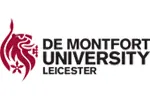At DMU, you will study anatomy and pathophysiology of the ear, how to test a babies hearing, managing someone with dizziness and how to best help adults with hearing loss. These practical skills sit alongside a strong scientific foundation, such as research and the properties of sound, all of which are strengthened by a mandatory clinical placement.
The knowledge and skills you learn with us help you to become the best practitioner you can be, whether an audiologist, hearing aid dispenser, in further study or research, putting the patient at the heart of everything you do.
Our graduates progress to work in a variety of settings, such as hospitals, private practices, research groups and the education sector. They frequently practice alongside multi-disciplinary teams, including doctors, psychologists and other healthcare staff.
Key features
- Our course is approved by the Health and Care Professions Council and accredited by the National School of Healthcare Science; this means that our graduates are eligible to apply for registration with the Academy of Healthcare Science and the Health and Care Professions Council.
- You’ll use four dedicated and specially designed clinical teaching spaces, equipped with the latest technology and training and teaching aids.
- You’ll learn with and from an experienced teaching, research and support team, alongside external industry, those with lived experience, and clinical experts.
- Assessment styles will vary across the programme: practical exams, problem-based learning, case studies, presentations, written exams, written pieces and placement.
- Your work placement enables you to put theory into practice and build the skills that graduate employers are looking for, which leads to a high proportion of our students gaining job offers prior to graduation.
- Our students have benefitted from international experiences through our DMU Global programme, which allows students to utilise skills around the world. Previous activities have included student connections with universities in Poland and Belgium, supporting and managing clinics in under-served communities in India, performing hearing screening at the Special Olympics and attending international conferences such as the ‘World Congress in Audiology’ held in Canada and South Africa.



